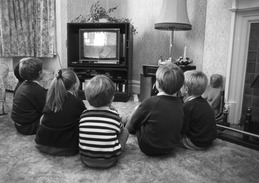|
By Fr. Mark Sietsema "Guard your heart with all diligence, for from it flow the springs of life." Proverbs 4:23  I find nursing homes depressing, and I’m sure I’m not the only one. I wonder, though, if others share my reason. It’s not the smell. It’s not the sight of old age and death. It’s that there is no escape from television screens. In nursing homes they are everywhere. They are all on, and all the time, too. The volume is usually up so high that you can hear your neighbor’s program three doors down. We are living in Aldous Huxley’s Brave New World, where in the Park Lane Hospital for the Dying, “at the foot of every bed, confronting its moribund occupant, was a television box.” Worse yet are the places where two people share a room. I die a little every time I find one of our parishioners a captive audience for the roommate’s set, glowing day and night. It doesn’t go off for sleep or doctor’s visits. It doesn’t go off for prayer or Sacraments. It doesn’t even go off when the roommate leaves the room. Its ads keep blaring, its laugh-tracks titter maniacally, its “Call NOW!” 800-numbers drill into the skull through sheer repetition. Keep your fire and brimstone: for me, this is hell. And hell is growing. Television screens are metastasizing everywhere. Are you waiting for a flight, passing time in the terminal reading a book? You’ll need Jedi-like powers to tune out the drone of Headline News all around you. Taking the family out to eat? Nowadays it’s fine dining to go to a place without video screens in all four directions. They’re in the doctor’s waiting room. They’re at the football stadium. They’re at the Y. They’re in the maternity ward and in the funeral home … I have a friend who calls TV “the drug that you watch.” Television really is a lot like a street drug: it might have limited beneficial uses, but for the most part it makes people sick, stupid, poor, and hooked. Television is a slow-acting poison. The more you ingest, the quicker the sickness sets in. So far I don’t have many regrets in life, but one of them is almost all of the hours I have spent in front of a TV. Need some facts? Here are a few from Michel Desmurget’s book on the subject, TV Lobotomy:
How so? If you didn’t watch so much, you would probably have more in savings. Television exists to advertise. That’s how TV networks and stations make their money. They don’t produce shows because they have a heartfelt mission to inform or entertain you. They simply need filler to stick in between the commercials. The programming exists to keep you watching from commercial break to commercial break. And aside from the ads, when they’re not directly hawking stuff, through the programming they sell you a consumerist lifestyle. So what’s wrong with advertising? Just this: one doesn’t need to advertise anything people really need. If they need it, they’ll come looking for it. You advertise things in order to create a demand for something for which there is no real need—laughing Elmos and puke-green milkshakes and minivans with built-in VCRs. No one needs these things. They want them because a commercial told them to. Watching television is intentionally exposing yourself to a con man who is trying ever to wheedle one more buck out of you. TV also makes the Church poorer. It’s a sad fact, but the majority of stewards in our parish and in the Archdiocese pay more each year for cable TV than they give to the church. The Lord rightly said, “Where your treasure is, there shall your heart be also” (Matthew 6:21). Follow the money trail in your life: does it lead to Christ or to a Cable package? If every one of our families gave up TV for just one month and donated that amount to the parish, the church would have money for just about everything it needs. Is TV addictive? Industry executives will deny it (taking their cue from the tobacco companies), but there’s no denying one’s own experience. People go through symptoms like withdrawal when their television is taken away. People keep watching for more hours than they know is good for them, in the classic sort of denial familiar to anyone who knows an alcoholic. Already back in 1971, a researcher named Herbert Krugman discovered that TV-watching had the same effect on the brain as some opiate drugs. Just try to have a conversation in a room where there is a video screen on: your eyes are drawn to it almost involuntarily. Television consultants have figured out down to the split-second just how rapidly they have to flash new images on the screen to keep you riveted. Think of how often the camera shifts nowadays: that’s the product of industry research. It keeps you hooked, just like a live wire fastens your grip around it as it electrocutes you. Television is the drug that you watch. The goal of this article is to convince you to Just Say No. The most effective fast we could each keep this Lent would be to give up half of our TV viewing time per week. It is perhaps the single best step you can take for progress in your spiritual life. You will have more time, more energy, more self-control, and more happiness. Are you bored? Cut out the very thing that causes much of modern boredom. Are you depressed? Go cold turkey on the device that dulls your brainwaves. Are you fearful? Ditch the tube and especially TV news (which plays on our fears). Are you down on yourself, low in esteem? Stop watching the machine that fills your mind with images impossible for a normal person to match up to. Are you overweight? Switch off the Mesmerization Machine, throw out that bowl of chips, and get up and moving instead. Dear Parishioners, I challenge you this Triodion and Lenten season to make a conscious effort to cut down on your television watching, and to use the time trying new things. It is a matter of spiritual health. Saint Paul counsels (Ephesians 5:16), “Redeem the time, for the days are evil.” Life is short and opportunities are fewer than we tend to think. Make the most of the time God gives you in this world. Start by swearing off the drug that you watch. Kalo Triodion! Kali Sarakosti! A Blessed Triodion and Great Lent to all [If you want to read more about the baleful effects of television, check out Jerry Mander’s Four Arguments for the Elimination of Television or Neil Postman’s Amusing Ourselves to Death.] From the Holy Trinity Church website: http://www.holytrinity-lansing.org, originally published on January 30, 2014
|
Topics
All
|

 RSS Feed
RSS Feed
